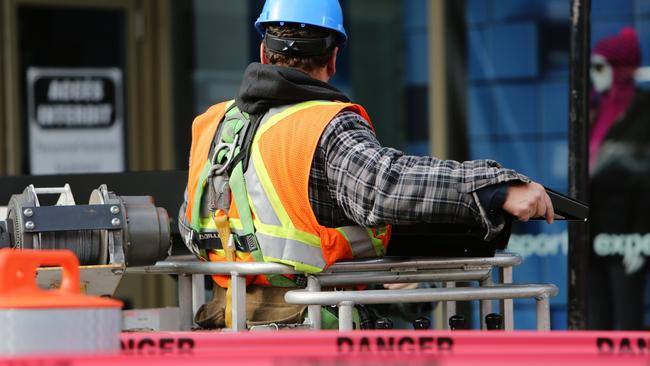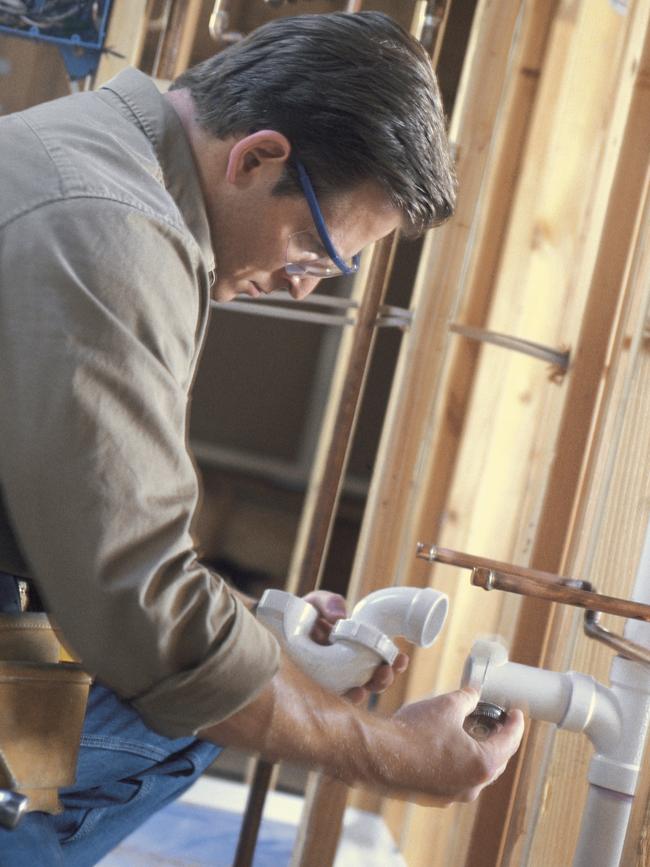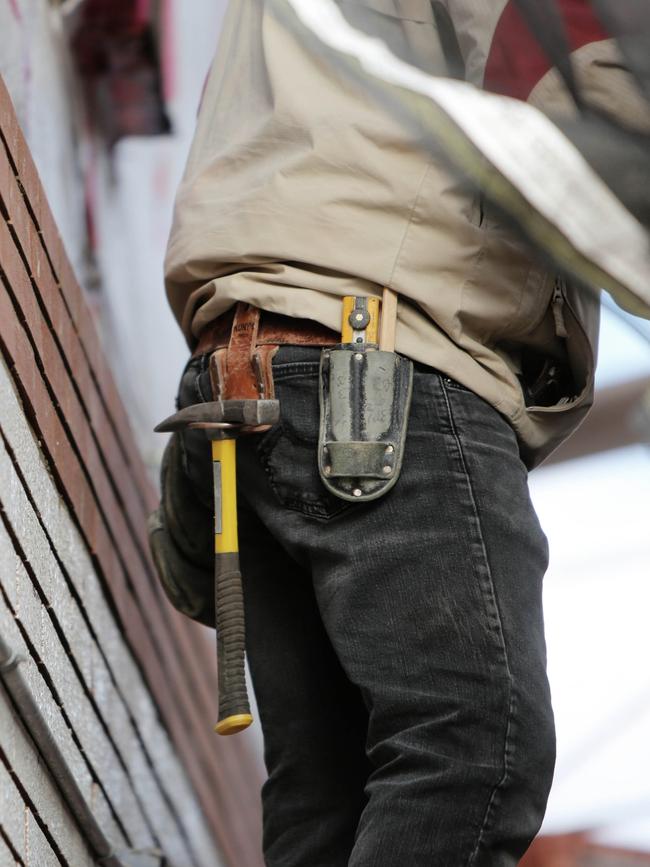‘How the f**k am I going to get out of this?’: Overwhelmed tradies report suicidal thoughts
Building company collapses are set to worsen the already-high suicide risk among construction industry workers, as Victorian tradies fear for their futures.
News
Don't miss out on the headlines from News. Followed categories will be added to My News.
A new report into what’s driving tradies and bosses in Australia’s embattled construction industry to considering suicide reveals ”crazy hours”, fears over future financial security and feeling like they will “never get off the tools”, are causing many to feel trapped and hopeless.
The landmark study shows Construction Industry Workers (CIW) “are at increased vulnerability to suicide, with repeated reporting of rates far greater for CIW than a range of comparison populations”.
Researcher Simon Tyler said feelings of hopelessness would likely get worse in Victoria, where building companies were collapsing.

“You look at the liquidations and the collapse of some of those companies and it’s definitely going to feed through the industries, particularly when you look at some of those things like job security being a driver (of suicidal thoughts) and obviously finances are a massive component of suicidal ideation — they cause a lot of stress for people in those situations … it’s definitely going to play a massive part in Victoria,” Mr Tyler said.
He said many tradies felt they had no option but to “stay on the tools” until they were well into their 60s and their bodies were giving out, and also felt compelled to return to work when they were exhausted or injured.
For bosses in the industry, “crazy hours” and stress were common, with many forsaking family time and their personal interests to work to try to keep their heads above water.
“That’s something we really need to address as an industry — trying to do better at creating a work life balance and some of those expectations around work hours,” Mr Tyler said.
Some construction industry workers interviewed for the study said they felt trapped or overwhelmed by their circumstances, and that those feelings were the main drivers behind their suicidal thoughts.
“You feel like you are suffocating. Like, you know, how the f**k am I going to get out of all this?” one said.


A psychologist, PHD candidate and the recipient of the MATES in Construction inaugural Allison Milner Memorial Scholarship, Mr Tyler said he was carrying on the important work of Associate Professor Milner, who championed efforts to curtail the high suicide rate among workers – predominantly men – in blue collar industries, and was “a luminary” in the area.
Associate Professor Milner was 36 and the mother of two when she was tragically crushed and killed by a falling tree in Melbourne’s Princes Park in August 2019.
The Reservoir resident was a renowned Australian researcher on mental health and suicide, based at the University of Melbourne’s School of Population and Global Health.
Mr Tyler said his research also showed relationship and family issues, social disconnection, personal financial hardship, perceived lack of support, substance abuse, child custody access and legal issues, and a traumatic or significant, adverse life event were drivers of suicidal ideation among those in the construction industry.
“Findings highlight several industry and personal related challenges that may drive experiences, with many potentially mitigatable by ACI (Australian construction industry) changes and focused prevention strategies,” the recently published University of South Australia research paper notes.
Measures including colleague and managerial support, ensuring time for outside work interests and social connections, access to mental health information and support and modified work hours and expectations could help mitigate risk, it said.


The paper — titled “And you feel like you’re suffocating … how the f**k am I going to get out of all this?”: Drivers and experiences of suicidal ideation in the Australian construction industry — says the financial state of a nation’s construction industry or health and safety legislations “will likely impact on suicide drivers”.
Some workplace cultures in the industry were also more likely to stigmatise mental health and suicide, making it less likely workers and bosses would reach out and seek help, it said.
Workers interviewed for the research were aged up to 66-years-old.
One spoke of regularly working up to 60 hours-a-week, after “working 80, 90, 100 hours weeks for a long time”, adding … “it took its toll”, while many spoke of a lack of work-life balance.
“Many participants highlighted that facing personal financial hardship, and the pressure that occurs because of these challenges, played a role in driving experiences of suicidal ideation and distress while working in the ACI,” the report states.
Some workers spoke of “being in a deadset logical mindset that it was better for myself and my family if I wasn’t around”.
Tradie suicide rates across Australia have reached an all-time high this year, as alarming new figures show a spike in calls for help from young blue-collar workers.
The collapse of major construction businesses like Porter Davis, concerns over being paid and harsh criticism from customers facing long delays are all taking a toll on the industry according to one of the state’s top building industry figures.
Australia’s largest home builder Metricon has also flagged concerns as they work to reduce stigmas around mental health discussions.
Non-profit group This is a Conversation Starter (TIACS) said calls from apprentices had accounted for just three per cent of those ringing the service in May last year.
The free, nationwide counselling group for blue-collar industries revealed young construction workers were now responsible for almost one in 10 calls this year.
TIACS head of partnerships Jason Banks said demand for the counselling service grew each month as workers struggled with the financial impact of business failures, relationship breakdowns, health challenges and workplace issues
“Tradies are doing it tough,” Mr Banks said.
Industry fund Incolink recorded a threefold increase in requests for responses to critical incidents related to suicide in the past 12 months.
Chief executive Erik Locke said they were seeking to remove the stigma around mental health discussions, with an alarming one construction worker taking their life every two days.
“We run mental health awareness sessions on site where workers are, around 3700 workers have attended a prevention education program already this year,” Mr Locke said.
Incolink also attends critical incidents, operates a 24/7 counselling line for construction workers and provides free, in-person counselling sessions to workers and their families.
Australian construction, mining and energy suicide prevention charity Mates in Construction revealed in a study last year that suicide rates between 2011 and 2019 among male tradies were about twice that of other male workers.




